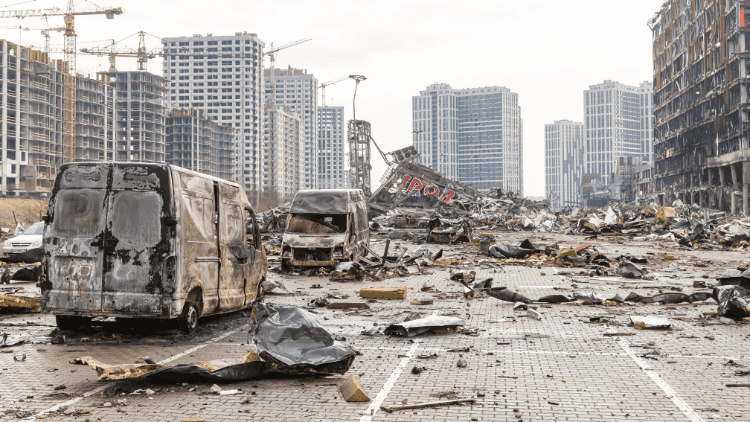The European Union says Ukraine’s reforms must follow international labour standards and social-dialogue principles.
The European Union has regularly expressed concerns about the radical labour reforms Ukraine has been trying to implement since 2020, openDemocracy has revealed. The controversial reforms seek to deregulate what the Ukrainian government considers the outsized role of trade unions in the workplace and excessive red tape on hiring, firing and management. But briefings dating from before and after the Russian invasion show the EU has urged the government to conduct reforms in line with international labour standards and in consultation with trade unions.
European Commission documents obtained through freedom-of-information arrangements expose an apparent divergence between Ukraine’s reforms and the EU’s ‘social market economy’. The findings come as Ukraine seeks to adapt its legislation to EU regulations as part of its candidacy and existing association agreement—a political, trade and economic reform deal designed to bring the country closer to EU standards.
But Ukraine’s homegrown reforms—which are separate from the EU harmonisation process—have been criticised by European and Ukrainian trade unions for breaching workplace conventions set by the International Labour Organization as well as European labour norms. ‘The Ukrainian authorities have made persistent attacks on trade union rights and sought to write them and workers out of the reform process,’ said Jan Willem Goudriaan, general secretary of the European Federation of Public Service Unions (EPSU).
Taking advantage of the war
According to a report prepared for a key EU-Ukraine summit in Kyiv on February 3rd, Ukraine’s legislation on socio-economic reform is at an ‘early stage’. Experts say the government is taking advantage of the war to pass otherwise difficult legislation dating from 2020 and 2021.
The country is currently under martial law, meaning protest is forbidden. But behind the scenes, EU officials have sounded a critical note on Ukraine’s proposals. Ahead of a high-level meeting to discuss the EU-Ukraine association agreement in 2021, officials were briefed to ‘urge Ukraine to ensure’ that the country’s labour-law reforms were ‘conducted with respect to social dialogue’ and in line with ILO conventions.
That meeting followed months of increasing tension between trade unions and the Ukrainian government in 2020 over a proposed new ‘Law on Labour’ which made a radical break from social-dialogue. After large-scale trade union protests, the draft law was dropped. But the draft law has since been put back on the table, as the government in Kyiv and the ruling Servant of the People party have pushed ahead with labour and social-policy reforms amid Russia’s invasion, which has put unprecedented pressure on the Ukrainian economy and state finances.
Other measures passed by the Ukrainian government in the past year include the introduction of zero-hours contracts and a wartime suspension of collective agreements between employers and trade unions. Parliament has also passed powers permitting the state to confiscate trade union property—despite the fact that the ILO is overseeing two complaints over disputed union property.
Removing protections
One new labour law, first mooted in 2021 and passed by parliament in July 2022 and signed into law in the following months, has come under particular criticism. It provides a ‘parallel regime’ for Ukraine’s small and medium-sized enterprises (SMEs)—which employ up to 70 per cent of the country’s workforce—to the national labour code, allowing them to use minimal employment contracts which treat employees and employers as ‘equal sides’ during negotiations.
The law also permits ‘at-will termination’ of employment and the ‘unilateral change by the employer of essential terms and conditions’—both of which breach ILO conventions and EU directives, according to a joint EU-ILO project. A last-minute change, brought about amid pressure from national and international unions, means the legislation, which was drafted without union input, is applicable only during wartime.
Lyubomyr Chorniy, a consultant who was an expert contributor to the law, said the extreme pressures of Russia’s invasion on Ukrainian businesses had made it possible to pass the law: ‘It seems to me there is a window of opportunity now. It’s very difficult for business at the moment.’ To give business ‘some kind of break, there was this idea to pass this draft law’. Chorniy argued that the law actually gave workers at Ukrainian SMEs more—not less—protection over their working hours, rest breaks, overtime and prompt payment of wages, by bringing more people into official employment, and bypassed ‘unjustified’ bureaucracy for employers.
Some Ukrainian politicians have been dismissive of what they see as overregulation of the country’s workplaces—even if regulation is part of the country’s international commitments, as with ILO conventions. Halyna Tretiakova, a Servant of the People MP and head of the parliamentary committee on social policy, has criticised the ILO, claiming its focus on collective rights is a barrier to Ukrainians striking over individual employment agreements, preventing the protection of their employment rights through more flexible means. The United Nations agency, Tretiakova said on February 15th, was ‘pushing the dying theories of Marx and Lenin’ on to Ukraine.
International standards
According to a December ‘needs assessment’ by the Council of Europe, the reforms have so far ‘mostly resulted in the deterioration of employment conditions’. Ukrainian trade union leaders have told the EU they understand the need to limit workplace rights during wartime but are worried about the long-term consequences of deregulation.
The European External Action Service responded last June, telling EPSU that it would ‘stay firm on its commitments to European and ILO standards’ on Ukraine’s reforms. Currently, the EU funds a project with the ILO on safe and healthy work in Ukraine.
That same month, the European commissioner for jobs and social rights, Nicolas Schmit, met Ukrainian trade union leaders in Brussels. He ‘stressed the importance of social protection, dialogue and workers’ rights as a cornerstone of the European social market economy’, according to minutes obtained by openDemocracy.
Schmit said he would raise union leaders’ concerns over the wartime reforms, and the lack of a role for trade unions in Ukraine’s reconstruction efforts, with the commission president, Ursula von der Leyen. He also encouraged Ukrainian unions to write to von der Leyen directly.
Social dialogue
Last month, a commission report on alignment between Ukrainian and EU law noted that ‘attention’ should be paid to ‘impacts of the introduction of new labour legislation on social dialogue’, which it said should be strengthened. The commission spokesperson for economic and financial affairs, jobs and social rights, Veerle Nuyts, said the EU ‘pays close attention to labour reforms in Ukraine’ and ‘makes use of any available opportunity to discuss these important issues’. The commission ‘underlined’ the necessity of meeting EU and ILO standards under Ukraine’s association agreement and candidacy for EU membership, she said.
Ukraine’s Foreign Ministry agreed. A spokesperson said the ‘alignment and realisation of internationally recognised labour standards … is one of the main tasks’ in the EU-Ukraine association agreement. According to Nuyts, ‘Ukraine has been constructively engaging with the EU on its alignment with applicable European directives as part of its wider labour reform’ in recent months.
But a European diplomat who has worked in Ukraine said on condition of anonymity that while they did not think it was the commission’s ‘intention to give Ukrainian reformers a green light’ on labour reforms, nor did it plan to stop them. ‘No one is pushing the European Commission on Ukraine’s labour reforms. It’s just not an issue,’ the official said, pointing out that the EU had ‘never’ made a public statement on Ukraine’s labour-law changes. Goudriaan of the EPSU said the commission minutes and briefing notes ‘suggest that attention is perfunctory at best … and this makes it easy for Ukraine to dismiss its international obligations on workplace rights’.
‘State non-interference’
Ukraine’s own draft plans for postwar reconstruction have, so far, reflected an intention to abandon social-dialogue principles. Outlines released last August state clearly that the country plans to move to a model of ‘non-interference of the state in dialogue between trade unions and employers’.
Chorniy said he believed social dialogue was ‘undoubtedly an important mechanism’, with a record in EU member states—and that it should ‘one day start working in Ukraine’. But it would require Ukraine’s economy to undergo a structural transformation, including the development of more active trade unions.
The anonymous European diplomat’s summary was stark: ‘We are witnessing the breakdown of the social state in Ukraine. Everything apart from the military is now outsourced internationally. Social affairs are more and more outsourced to international donors—which is why international donors should pay more attention to this.
‘The [deregulatory] Washington Consensus has never been more alive than in Ukraine. It is Ukrainian-initiated, but in the west we accepted it. And for Ukraine, this is a way to get closer to the west, and to fight the local oligarchs.’
The commission told openDemocracy it would ‘follow up as appropriate to ensure that commitments under [Ukraine’s] association agreement are properly upheld’.
Source : SocialEurope





































